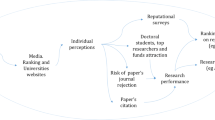Abstract
Over the last two decades, enumeration has become a critical force in crafting the governmentalities of globalizing higher education. Whether in the glossy Web sites and documentation of the world’s ‘top universities’ or in more fine-tuned regional and subject guides, accreditation schemes, journal metrics or h-indexes, technologies for measuring and ranking academic performance have not only created new imaginaries of reputation but also started to reshape institutional behavior in the pursuit of enhanced performance. In this paper, we critically explore these governmentalities of globalizing higher education through a discussion of the competing logics and landscapes of reputation and ranking in two leading universities in South Korea. Our analysis draws attention to the ways in which university rankings have generated a new multi-scalar geography of institutional reputation, the mismatch between quality, reputation and ranking, and the new kinds of institutional behaviors that are emerging to respond to the proliferation of ranking systems. Through this analysis, our paper offers two critical contributions to the current literature on university reputation. Firstly, we offer a critique of the high-level metrics used in university ranking and their implications for the quality of institutions. Secondly, we also argue for more nuanced accounts of ranking and reputation by scholars of higher education and in particular a greater emphasis on their successes and failures, the competing logics and unexpected outcomes of ranking and their implications for the future of universities.
Similar content being viewed by others
References
Altbach, P. G. (2012). The globalization of college and university rankings. Change: The Magazine of Higher Learning, 44(1), 26–31.
Bourdieu, P. (1984). Distinction: A social critique of the judgement of taste. Cambridge: Harvard University Press.
Brady, M. (2014). Ethnographies of neoliberal governmentalities: From the neoliberal apparatus to neoliberalism and governmental assemblages. Foucault Studies, 18, 11–33.
Byun, K. Y., & Kim, M. (2010). Shifting patterns of the government’s policies for the internationalization of Korean higher education. Journal of Studies in International Education, 15(5), 467–486.
Collins, F. L., & Ho, K. C. (2014). Globalising higher education and cities in Asia and the Pacific. Asia Pacific Viewpoint, 55, 127–131.
Collins, F. L., Sidhu, R., Lewis, N., & Yeoh, B. S. (2014). Mobility and desire: International students and Asian regionalism in aspirational Singapore. Discourse: Studies in the Cultural Politics of Education, 35, 661–676.
Foucault, M. (1991). Governmentality. In G. Burchell, C. Gordon, & P. Miller (Eds.), The foucault effect: Studies in governmentality. Chicago: University of Chicago Press.
Gilbert, P. R. (2015). Commentary: The ranking explosion. Social Anthropology, 23(1), 83–86.
Guyer, J. I. (2014). Percentages and perchance: Archaic forms in the 21st century. Distinktion: Scandinavian Journal of Social Theory, 15, 223–238.
Hazelkorn, E. (2011). Rankings and the reshaping of higher education: The battle for world-class excellence. London: Palgrave Macmillan.
Ishikawa, M. (2009). University rankings, global models, and emerging hegemony critical analysis from Japan. Journal of Studies in International Education, 13, 159–173.
Jöns, H., & Hoyler, M. (2013). Global geographies of higher education: The perspective of world university rankings. Geoforum, 46, 45–59.
Kim, T. (2009). Confucianism, modernities and knowledge: China, South Korea and Japan. In R. Cowen & A. M. Kazamias (Eds.), International handbook of comparative education (pp. 857–872). Netherlands: Springer.
Kim, A. E., & Park, G. S. (2003). Nationalism, Confucianism, work ethic and industrialization in South Korea. Journal of Contemporary Asia, 33(1), 37–49.
Larner, W., & Le Heron, R. (2005). Neo-liberalizing spaces and subjectivities: Reinventing New Zealand universities. Organization, 12, 843–862.
Lee, S. (2004). Korean higher education: History and future challenges. In P. Altbach & T. Umakoshi (Eds.), Asian universities: Historical perspectives and contemporary challenges (pp. 145–184). Baltimore: The Johns Hopkins University Press.
Lewis, N. (2011). Political projects and micro-practices of globalising education: Building an international education industry in New Zealand. Globalisation, Societies and Education, 9(2), 225–246.
Marginson, S. (2007). Global university rankings: Implications in general and for Australia. Journal of Higher Education Policy and Managemenet, 29(2), 131–142.
Miller, P. (2001). Governing by numbers: Why calculative practices matter. Social Research, 68(2), 379–396.
Miller, P. (2004). Governing by numbers: Why calculative practices matter. In A. Amin & N. Thrift (Eds.), The Blackwell cultural economy reader (pp. 179–190). Malden: Blackwell.
Miller, P., & Rose, N. (1990). Governing economic life. Economy and Society, 19(1), 1–31.
Mok, K. H. (2007). Questing for internationalization of universities in Asia: Critical reflections. Journal of Studies in International Education, 11(3–4), 433–454.
Power, M. (1997). The audit culture: Rituals of verification. Oxford: Oxford University Press.
Sampson, S. (2015). Comment: The audit juggernaut. Social Anthropology, 23(1), 80–82.
Shore, C., & Wright, S. (2015). Governing by numbers: Audit culture, rankings and the new world order. Social Anthropology, 23(1), 22–28.
Sidhu, R. (2002). Educational brokers in global education markets. Journal of Studies in International Education, 6(1), 16–43.
Sidhu, R., Ho, K. C., & Yeoh, B. (2011). Emerging education hubs: The case of Singapore. Higher Education, 61(1), 23–40.
Vught, F. V. (2008). Mission diversity and reputation in higher education. Higher Education Policy, 21, 151–174.
Yeoh, B. S., Foong, M., & Ho, K. (2014). International students and the politics of language among ‘globalising universities’ in Asia. Knowledge Cultures, 2(4), 64–89.
Acknowledgments
The research discussed here comes from the Globalising Universities and International Student Mobilities in East Asia project funded by the Singapore Ministry of Education Tier 2 Grant scheme (Number: MOE20089-T2-1-101, Principal Investigator: Assoc-Prof Ho Kong Chong, National University of Singapore). The Korea Foundation provided support for manuscript writing within a Field Research Fellowship for Francis Collins. The constructive reviews of two anonymous referees have been helpful in refining the arguments developed in this paper. The usual disclaimers apply.
Author information
Authors and Affiliations
Corresponding author
Rights and permissions
About this article
Cite this article
Collins, F.L., Park, GS. Ranking and the multiplication of reputation: reflections from the frontier of globalizing higher education. High Educ 72, 115–129 (2016). https://doi.org/10.1007/s10734-015-9941-3
Published:
Issue Date:
DOI: https://doi.org/10.1007/s10734-015-9941-3




